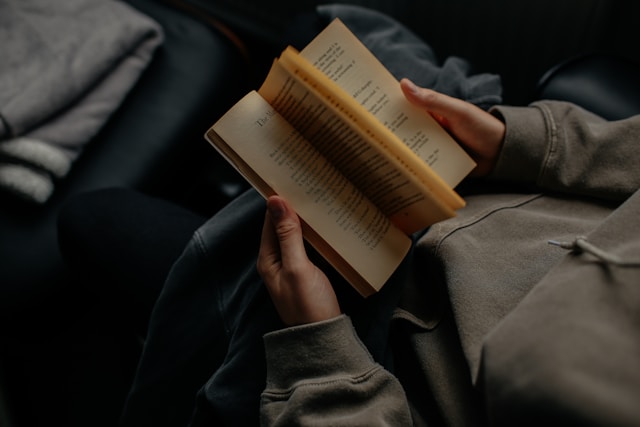I’ve always been a reader. I was hooked from the first time I held a book in my chubby little hands. Now we have shelves and shelves and boxes upon boxes of books in our home and it’s a little bit of heaven. My wife and I both have multiple books stacked around us at all times. They’re like little fortresses of cardboard and paper. Story castles.
I’ve always been fascinated by people who don’t love to read. I admit that I’ve been judgy about it over the years. “How can they not like to read?” is a complaint my wife has heard me ask many times. I’ve wondered about it more than is healthy, more than I’ve wondered about the whole sock-disappearing-in-the-dryer phenomenon. Then a couple days ago I came to a realization about why some people don’t love reading — or even like it at all. There are many reasons, of course, and in fact during my research I learned that there’s actually an anxiety disorder called Bibliophobia, which is the fear of books. It’s rare, and I don’t believe it’s an issue for the majority of people. After dismissing anxiety disorders and being shipwrecked at a young age, the biggest reason I landed on for why some people don’t read is school. Or at least the schools in my experience.
After the lower grades, we weren’t taught that books are a form of entertainment (Hint: they are). Sometime after 7th grade, we were no longer taught that books contain exciting stories nestled between covers. Somewhere along the way they morphed into intellectually heavy tomes to be dissected, out-of-context paragraphs to be studied, and comprehension questions to be answered like so many algebraic equations.
The schools beat all the fun out of books.
Every now and then, there’s a teacher or librarian who wears their geekiness for reading on their sleeve and helps students discover — or rediscover — that books were written for people to enjoy. Sometimes it’s too late to turn a kid against reading, because they’re already hooked (yours truly). But for some, reading becomes a chore, just another boring homework assignment to suffer through on the path to college. Don’t get me started on the horrors of the group read. You take a kid who’s still stumbling their way through pronunciation, force them to read out loud in front of their giggling peers, and you just shattered any possibility that they will ever enjoy reading. Still, some kids manage to hold on to the thrill that comes from picking out a new book or revisiting an old one with the cover that needs taping again. Schools can’t kill all the fun, but they sure like to try.
I don’t remember any of my teachers in high school asking if I liked a book or story I was assigned, only if I understood it. “What does the author mean by this paragraph?” “What is the significance of the main character’s reluctance to participate in the ancient ritual?” Those are important things to understand when you’re reading — sometimes struggling through — older authors like Dickens, Melville, or Austen. And I believe this is an important lesson to teach students, that sometimes you’re not going to like a book and that is entirely okay. It doesn’t make you an idiot if you don’t enjoy Great Expectations. It’s okay to know that you don’t appreciate that style of writing. I think I’ve picked up Moby Dick fifty times and I still haven’t made it to the end. When Ismael gets on the ship it suddenly turns boring for me. So I put it down and go read something easy like Stephen King. When reading becomes an assignment, it becomes a chore. By assigning reading and attaching pass or fail pressure to comprehension, schools helped create the system of reading the Cliff’s Notes version. Cliff’s Notes helps with grades, but it kills the love of reading.
It’s not entirely the fault of the schools. There are lots of forces at work that turn people away from reading. Society often tells us that “Books are for girls,” or that only brainy, over-educated nerds read books. Parents can reinforce these ideas unknowingly through subtle actions or conversations. Throughout history there have also been barriers to entry for people of color that make getting into books challenging. For example, I’ve had black friends who didn’t visit the library because the one time they tried they were followed around like a criminal. Similarly, some didn’t grow up with books in their homes because they were thought of as something “not for them.” I could never comprehend that experience as completely as someone who experienced it firsthand, yet I understand it as a reason.
Money can also play a big, yet mostly unseen role in keeping kids from getting into reading. I was fortunate enough to experience the joy of seeing the Scholastic Books box arrive in my classroom, knowing there were at least three books waiting for me inside. Some kids never got those books. At the time I couldn’t imagine there was an economic barrier, I just assumed they didn’t like to read. Now I know better.
Lastly, there are those who just don’t get into books very much. Some people get lost in video games, others would never pick up a joystick to save their lives. For some people, reading anything other than Sports Illustrated or Newsweek seems like a waste of time. I’m trying to practice non-judgment. I still think they’re missing out, but it’s kind of like how my kids think I’m missing out by not playing Baldur’s Gate or Fortnite. They might be right, but they’re not forcing it down my throat and I’m not going to do that with books, either. They like to read — maybe not as much as my wife and I do, but we set the bar pretty high.
I’ve pointed out lots of reasons why people may not like to read, but why do I care if people read or not? I considered that maybe I was just getting judgy again, so I thought some more about why I care, or why anyone would care. And I discovered that it’s not just about me.
For one, people who read a large variety of books tend to develop a broader view of the world. I know that I’ve learned a lot about our history and how people from other cultures think through the books I’ve picked up. And I’m not just talking about dry old history books, I mean novels and stories that were actually fun to read. I’ve learned about our differences, but more importantly I’ve discovered how we’re all very much alike in the ways we love, our struggles, and our purpose as humans. I like to see people reading because it helps create a society that’s harder to divide so easily. Reading stories that stretch across cultural, gender, racial, societal, or religious lines may not bring total understanding, but it’s a step in the right direction.
People who read always have something to do. Especially today when it’s so easy to turn to social media for entertainment (guilty as charged), books are an escape that doesn’t come loaded with derisive comments or annoying ads. They say idle hands are the devil’s workshop, and even if you don’t believe in the devil you can appreciate the sentiment. Bored people do dumb things. Someone who can get lost in a book is almost never bored.
Reading has the power to bring us together. It’s an easy conversation starter to ask, “What are you reading these days?” or “What are your favorite books?” And if you encounter someone who doesn’t read, well, that’s a conversation, too.
I think reading makes us better. More interesting. Harder to scam. Less divisive. More open to new ideas. If you haven’t been a reader and you hate reading, I encourage you to pick up a book and try it again, even for fifteen minutes. It doesn’t matter what book, and yes, it’s okay to judge a book by its cover. Choose something that just looks fun. Or weird. Something you think that only you would find interesting. It doesn’t have to be on the New York Times Best Seller list, although that can be a good place to start. Find a book that looks good to you. And if it’s boring, put it down and find another one. You wouldn’t keep eating a meal you didn’t enjoy, so don’t choke down a novel that isn’t engaging you. If you don’t like the Filet Mignon, grab a hot dog, a banana, or even some Sour Patch Kids. I’ve had to teach myself over the years that it’s okay if I just say, “Meh” in Chapter One and put the book down. Life is too short. There are lots more books into which I will disappear from the first page.
I love that I’m surrounded by books. I’m very fortunate to have the luxury of books. And even though the books take up just about every available surface in the house, I still manage to find something new at the library or a thrift store. I love that I always have something to do, wherever I am, that’s not Instagram or the news.
I’ll end this with my conversation starter. What are you reading these days?


Leave a Reply